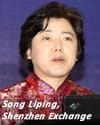Song Liping, president and CEO of the Shenzhen Stock Exchange, has admitted the Chinese securities industry still has a long way to go to meet the demands of the real economy through its gradual transitioning phase. Speaking at the Brokerage Innovation Conference on 8 May 2013, Song admitted the task was becoming urgent.
Within the A-share markets of Shanghai and Shenzhen, the market value of listed companies in cyclical industries – including finance, real estate, petrochemicals, electronics, and machinery – account for 52.6% of the total amount. He contrasted this spectrum with that of the USA, where these kind of sectors represent only a quarter of the index, whereas technology and consumer industries account for nearly 60%.
Nonetheless, these listed companies are the best firms that China has to showcase in the public markets, so Song deduces that general shortcomings in industrial structure and a lack of core competitiveness might therefore be even more prominent in the real economy.
Song pointed to the reforms enacted locally, such as establishment of the OTC market, increased input in mergers and acquisitions, the launch of SME private bonds, and the development of equity pledge financing business. But she said securities firms had to improve their game, specifically by in the field of internal controls and due diligence practices.
“The establishment of the new National SME share transfer system and the OTC market as well as product innovation will be more dependent on the quality of securities companies’ due diligence processes,’ she said. “A lot of work remains to be done to meet the actual demands of enterprises and enable the capital market to better serve the real economy.”
Song pledged to accelerate mergers and acquisitions by listed companies and to improve both the quality of potential issuers and market screening and expand access to capital markets, saying that growth enterprises would not be allowed to fall down at the threshold of the capital markets.
“This requires a range of innovation in institutional arrangement, financial products and platforms. Innovation is a real challenge and its associated risk deserves more attention. If major problems ever occur, market confidence will be lost and client trust will be ruined,” she said. “Furthermore, such scenarios will significantly narrow the development space of securities companies, may negatively affect market reforms and innovation and ruin the opportunity for development in the industry, which would be tantamount to a collective degeneration of the whole industry.”
Song also called for a greater degree of self-regulation within the securities industry, concerning matters such as investor suitability and product innovation, which she accompanied with the ominous warning.
“Without effective self-regulatory mechanism, introduction of rigid administrative supervision would be necessary.”
